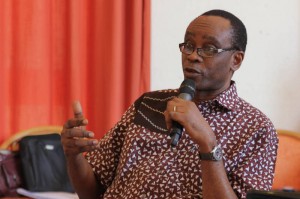Although we do know that the environment affects everything we do in life, including how we live and die, we often think that it does not matter what we do to the Planet. Demands for stewardship in relation to how we relate to the gifts of Nature are sometimes regarded as affront to political power wielders and corporate entities that claim ownership of our lands, waters and the several gifts that Nature has endowed us with.

As we approach the rescheduled 2015 election, the thing that matters most to us, our environment, has been pushed to the backseat by the political players who are concerned with how to grab our votes without telling us what they would do with the very thing that supports our lives and livelihoods.
The parties proclaim transformation and/or change. We have seen change. We are living in change. Our waters have been changed into polluted and heavily toxic soups. Our air hangs heavy with noxious fumes. Frantz Fanon famously said: “We revolt simply because, for many reasons, we can no longer breathe.” The truth is that we have got to the point where we can hardly breathe.
Our lands have been transformed into mishmash of toxic dumps. In some places our environment has been almost irreversibly changed from what Nature generously gave to us. Our effort today is to prepare platforms for demanding and for building the real change that we need.
In line with our conviction that the environment is our life Health of Mother Earth Foundation (HOMEF) is collaborating with our communities in conducting organised conversations on our environment and our environmental re-sources. We salute the resilience of our people as they carry on living in heavily impaired environments and their resolution to tackle the challenges foisted on them by factors that are external to their communities. In keeping with our tradition we stand at one with our people in their struggles to catch at least a whiff of fresh air.
As we engage in these Community Dialogues, we keep in mind the basic principles of Re-Source Democracy as captured in our document of the same title:
Re-source democracy hinges on the recognition that a natural ‘resource’ fundamentally belongs to Nature and secondly to communities of species and peoples who live in the territory or have traditionally held the territory where the ‘resource’ such as forests, rivers or grazing lands exists. Re-source democracy is about stewardship that recognises the right of citizens to establish rules and to act in line with traditional as well as best available knowledge to safeguard the soil, trees, crops, water and wildlife first as gifts of Nature and secondly to enjoy the gifts as necessary provisions that support their lives and livelihoods as well as those of future generations. Re-source democracy calls on us to re-source, to re-connect with Earth – our source of life – and to respect her as a living being with inherent rights, and not just a ‘resource’ to be exploited.
It hinges on pragmatic politics and wisdom that our relations with nature cannot be left to speculators and manipulators of market forces whose drive is to commodify Nature. It ensures the right (and demands a responsibility) to participate in decisions that determine our access to, and enjoyment of nature’s gifts and removes the obstacles erected by the politics of access while providing process for redress. It demands that certain places must be off limits to extractive activities especially when such re-sources are found in fragile ecosystems or in locations of high cultural, religious or social significance in order to support the higher objectives of clean and safe environments to ensure citizens’ wellbeing.
A clear understanding that Mother Earth has the right to regenerate her natural cycles without disruption by third parties should place a burden of protection on all humans. Taking up the defence of our ecology is a mark of enlightened self-interest because when we destroy, or permit the destruction of our environment, we invariably diminish ourselves.
The Community Dialogues (CD) are diagnostic exercises that provide space for community members to go down memory lane, review the environmental situation of their communities and identify areas where actions are inescapable if they are to restore, preserve and defend their heritage.
These Dialogues are not restricted to rural communities but can work well in urban and even in specialised communities such as schools, estates and workplaces. The Dialogues are community driven exercises and participating communities set areas of priority action after the initial diagnostic conversations. To aid these exercises we have prepared a Guiding document that communities are free to adopt and/or adapt.
It is our hope that these Community Dialogues will lead to the formation of ecological defence teams and networks in our communities, something akin to the Ogoni Women Ecological Defenders (OWED) Network that was inaugurated in August 2014 at Bori, Ogoni. From the enthusiastic buy-in and ideas generation prelude to these Dialogues we are confident that they will not be mere talk-shops but veritable platforms for action towards the restoration of damaged community environments and full restitution by polluters and their backers. After the dialogues we will follow up with paralegal, community environmental health and monitoring trainings as may be required.
By Nnimmo Bassey, Director, Health of Mother Earth Foundation (HOMEF)
